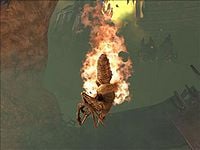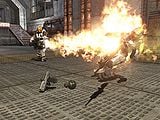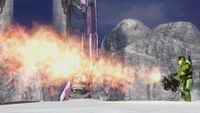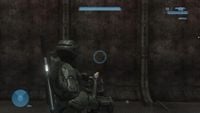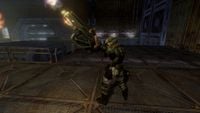M7057 flamethrower
From Halopedia, the Halo wiki
- "It takes a real lunatic to use a flamethrower..."
- — Anonymous E2-BAG/1/7 serviceman
The M7057/Defoliant Projector[1][2], more commonly known as the M7057 Flamethrower, is a UNSC heavy ground weapon.
Design Details
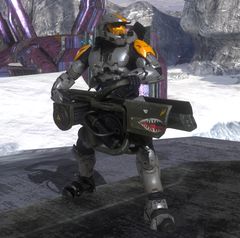
The M7057/DP, is a standard chemical flamethrower, which projects and ignites a stream of a volatile, semi-liquid fuel. Flamethrowers are cumbersome and relatively difficult to tactically employ. It originally appeared in the multiplayer of Halo PC and Halo 3. It also appeared in several Halo 3 campaign levels and one campaign level in Halo 3: ODST. Referring to the M7057/DP as a weapon is a bit of a misnomer as the "DP" in its nomenclature indicate that it is a 'Defoliant Projector' — to be used to rapidly clear away heavy foliage for in-theater construction projects and to destroy new or persistent growth from emplacements and/or hardened military assets. It is normally used with a cart, instead of being carried.
The Halo 3 version of the M7057/DP varies slightly from its first appearance in Halo PC, being roughly two times heavier (with about twice as much fuel) with a shorter and wider nozzle (which means a shorter but wider, deadlier spray); however, both Flamethrowers, still retain the similar shark decal, despite these changes. The Flamethrower is extremely powerful in Halo 3, and can kill its target (even a Warthog) in less than three seconds before it overheats.[3]
It is one of two Human weapons that overheat, with the other being the Spartan Laser. It has a built in failsafe system that stops the weapon firing when it reaches a certain temperature. If the weapon could be fired while overheated, it would melt or explode, and the heat and the flames would harm the user. In Halo PC, the Flamethrower overheats if used non-stop when depleting 40% of the fuel.
In Halo 3, the M7057/Defoliant Projector is in the Support Weapons category, like the Missile Pod and AIE-486H Heavy Machine Gun, meaning wielders use the weapon in a third-person perspective and move at a slower movement rate, and must drop the weapon to melee and cannot use Grenades or Equipment, with the exception of Invincibility and cloaking in Campaign. This feature does not apply to Halo PC.
Advantages
In both Halo PC and Halo 3, the Flamethrower is very powerful, laying waste to any opponent in close quarters. It can be used strategically to put flame in front of entry ways as a denial of entry, or to shoot it while running backwards around a corner (giving you the ability to damage them but denying them a direct line of sight to you).
The Flamethrower is one of the deadliest close combat weapons in the game, besides the Energy Sword and Gravity Hammer. The spread, stickiness, and lethality of the flame makes it nearly impossible to escape when in the hands of a skilled player. However, in rare cases, if a player walks through a Bubble Shield or a plasma shield (like on Snowbound or Epitaph), the game engine will ignore the damage and the player will survive (with low shields). Effective utilization of the chemically-active volatile spray and the damage-per-second (DPS) dynamic can make the Flamethrower the most effective shield-stripping tool in the game, as it can easily tear throw shields with close proximity short-burst shots (making the opponent a "One-Shot"), allowing another teammate to quickly finish off the opponent with a single head shot. It is very effective to use around corners or at entrances, similar tactics as "camping", but even though you cannot crouch and hide while using the Flamethrower, it is a great weapon to use in conjunction with this tactic as enemies can be quickly stopped with a quick ignition. Teammates who utilize Plasma Grenade or Fragmentation Grenade throwing in tandem with Flamethrower-spray can effectively quell any enemy infantry and provide a formidable force of explosions. The Flamethrower can also be used as a psychological weapon, as its mere appearance and use strikes fear into the enemy.
Disadvantages
In Halo PC, the Flamethrower's reload rate is very slow, making the player vulnerable to all sorts of attack. Additionally, the Flamethrower, along with its fuel supply, is very rare, and respawns at a very slow rate. The Flamethrower is also incapable of doing ranged attacks; therefore, while using this weapon in combat, your movement options are limited. It also flouts a powerless range ability, which can ‘‘clearly’’ be seen from afar, making you a target for snipers or sharpshooters.
In Halo 3, like with all support weapons, you cannot refuel the Flamethrower. Maneuverability is much more difficult and movement speed is slowed, and the player wielding a Flamethrower cannot melee. You also cannot throw grenades or use equipment without having to drop it first. The Flamethrower is only a threat (potentially to all players) in confined spaces; in open spaces, it's very hard to directly harm your opponent. The Flamethrower also makes it impossible to crouch and to disappear on enemy motion sensors--making stealthiness an impossible component of battle while wielding the projector. The DPS (damage per second) aspect of this weapon also makes it potentially lethal to all players, as the chemically projected fluid will pool on all surfaces (even ceilings and walls) for a brief period (yet on the ground the pool lasts longer) and can be a deadly trap for any player nearby. Once ignited, depending on the range and amplitude of ignition (how much of the fluid is burning upon you) the player's shields will quickly, or slowly, fall. The only way to combat the "burn" DPS effect is to use a Regenerator, however this may not save those that are fully ignited. Another danger to this weapon is that when an enemy is ignited, depending on the exact DPS ratio (if they are fully ignited and they are burning fast, or if they're only ignited a bit and they're burning more slowly), the enemy may run up to the user while on fire and cause a secondary proximity ignition to everyone around them, even their teammates. This danger is similar to the lethal proximity of an enemy stuck with a Plasma Grenade or a Spike Grenade that can simply run up to you and kill you with the same explosion that kills them.
This weapon can be very messy and hard to maneuver for early first-time players so it is generally advised that experienced players use the weapon, as it is very easy to betray teammates with the spray. Also, once the weapon is "overheated" it must be fully re-cooled before it can fire again. It is advisable to use the burst-fire tactic that one would use with the Assault Rifle--this method not only conserves ammunition, but it allows for a safer spray and alleviates some of the dangers that come with rampant wide spray (betrayals, setting traps, etc). The Flamethrower can also ignite nearby grenades, making it much more dangerous when many corpses are gathered (depending on the grenade count) or nearby grenade spawn points. Once ignit
Influences
The Defoliant Projector was inspired by a similar flamethrower from the Marathon series. The Defoliant Projector's number, 7057, is an alpha-numeric call-back to the weapon from Marathon's name, the TOZT which means TOST (Toast) in leet speak.
The shark-like decal on it is borrowed from the WWII fighter plane model Curtis P-40, which had the tiger-shark decal, painted on it by the Flying Tigers (American Volunteer Group).
Tactics
Campaign Tactics
With the Flamethrower's campaign introduction in Halo 3, it has become one of the best anti-Flood weapons. The hardest type of Flood to fight, the Flood Pure Forms, will die nearly instantly, upon lighting on fire, and destroy any Infection Forms that run over the flames. Though still highly effective against Flood Combat Forms, they still live for some time while on fire, which can produce some awkward moments of avoiding their charging, flaming bodies. Given light of this, it is not recommended to use the Flamethrower in cramped spaces, many of which can be found in the level Floodgate, as the flaming Flood will lead to frustrating suicides.
A good attribute is that it can begin killing multiple combat forms at once, with the ones on fire possibly lighting other ones on fire. Once they die, their bodies are consumed by the fire and will not be able to be resurrected by Flood Infection Forms. In fact, any Infection form that runs towards the body will also be destroyed by the flame. It can also be used to destroy a pile of Combat Forms, so they won't come back if an Infection Form finds them.
Multiplayer Tactics
The Flame Thrower is a support weapon, and a support weapon only. If you are wielding this weapon, you back up your fellow Spartans. Lighting a whole team on fire can help out your team mates, by weakening their shields. Just be careful, if used incorrectly, you could set your whole team on fire, the flame spreads easily.
In Halo PC, it is available in every multiplayer map, but in small numbers. In Halo 3, the Flamethrower, by matchmaking default, only appears on the map, Construct.
The Flamethrower is best used in close quarters combat. The trail of flame can act as a temporary smokescreen to blind snipers with. It is especially effective if used to retreat by running backwards away from an enemy to leave a trail of flame, deterring would-be pursuers from giving chase to a wall of fire, use caution because the Flamethrower's damage is reduced when running backwards. It is effective as a denial of area weapon, you can set fire to doorways or flags to discourage anyone from crossing that area, and damaging those that do (possibly even catching on fire and killing unshielded opponents).
As a Slayer weapon, it is recommended to use it to surprise people entering enclosed spaces, as it is very lethal up close. You can shoot the flames around a corner as you run backwards around a corner, and any opponents who choose to take the risk of pursuing them will be roasted by flames but unable to get a line of sight to get you themselves.
Sometimes, players even wait near some strategic points, with Active Camouflage and a Flamethrower, for example they may wait at the point at which players land after flying out of a Man Cannon and burn the helpless victims. Or sometimes they can hide at one side of a door and when a player runs out, they can burn the unsuspecting player to ashes.
Most types of equipment can often be used to your advantage when escaping the flames, like deploying a Radar Jammer (although it is now not available in matchmaking) to confuse the enemy if he/she can't exactly see you due to the continuous flames, and since you'll be moving about, the enemy can't exactly identify you from the "fake" red dots on his/her radar. Deploying a Power Drain will cause the wielder of the Flamethrower to cease fire temporary to avoid having their shields to be drained if smart enough, however, if the wielder continues to fire they risk being drained of shields and made an easy target to any enemy players in the vicinity.
UNSC Remarks
- "Foxtrots die pretty quick once you put the fire to 'em. We oughta burn 'em all. Low-life bastards. Burn all those low-life Alien Foxtrots."
- "Gotta get too close for it to be any use offensively — if you're gonna use it as a weapon best to use it in a defensive role—fill up passages and weak-points in your perimeter with fire."
- "Makes short work of weeds and thickets — but I wouldn't carry one into combat. Not on your life."
- "I can see where it would be real effective in ousting dug in troops, but you aren't gonna be making any friends using it that way."
- "I don't see why carrying around a big can of super-flammable stuff right next to my ass is such a good idea."
- "You know those things ship with a cart, right? You aren't expected to carry them anywhere… they are not a weapon that you use on people...not even on alien people."
- "It takes a real lunatic to use a Flamethrower..."
Trivia
- Present-day flamethrowers have a range of up to one hundred meters (about 300 feet). Strangely, 540 years in the future, the range has decreased by 86%, the weight has significantly increased, and the ammunition capacity has decreased, but it is possible that it is just for gameplay and is not as a canon element.
- Strangely, even though UNSC remarks claim that their comrades wield the Flamethrower, you can't give it to them in game. This may be due to game-balance issues. The only time when a Marine is seen wielding one ever is at the Halo 3 level Floodgate, it is seen being used inside the factory, (the spot where your surviving Marines hold position) holding it like Master Chief. You need to be in camera mode or playing on a lower difficulty to see the Marine holding it, because he dies in a few seconds.
- In the cutscene of the level Keyes, where the Master Chief retrieves Captain Jacob Keyes' neural implants, the Master Chief was meant to burn Keyes' skull out of the Brain Form/Proto-Gravemind and retrieve the implants. Unfortunately, due to time constraints, the Flamethrower was removed. Lorraine Mclees was the one who actually had to skin the whole "burnt" skull and she added that she had done her job so well that "the skull was so gruesome no one could look at it."[4]
- In Halo: Combat Evolved, when a Spartan wields a flamethrower, he flips back a cover to expose a button. Next to the button is the character 下 or 'xia' (meaning "down" in Chinese).
- In Halo 3, if you go underwater in Last Resort, Valhalla or High Ground, the Flamethrower will still work underwater and be able to burn people. However the flames must have already clumped to something and spraying into the water will have absolutely no effect on Spartan or Elite players. Strangely, in Avalanche and Snowbound, if one fires at the snow it will burn as if it is ground.
- The only level that features the Flamethrower in Halo 3: ODST is Data Hive. It is not featured in Firefight mode whatsoever. It should be noted you move faster with a support weapon as an ODST than a Spartan-II or Sangheili. This is done for gameplay reasons only.
- In Halo 3, the Flamethrower can be used to easily achieve a Death from the Grave Medal or an Incineration Medal. If you simply hit an enemy with enough sustained fire, it will kill them. If you have already hit an enemy with the flamethrower when you die, they will die via flame damage seconds later.
- The Flamethrower fires a stream of volatile ignited chemically-active liquid that uses the elements of a "damage per second" (DPS) weapon, making it a unique tool in both matchmaking and campaign.
- In Halo 3, walking close to the flames fired by the Flamethrower will cause a bright flash, which will partially blind you.
- The Flamethrower in Halo 3 is the only Support weapon affected by the Infinite Ammo option in Custom games, since it is also the only support weapon that cannot be detached from turrets.
- The Flamethrower in Halo: Combat Evolved is one of the most unique weapons in the Halo trilogy; it is the only weapon that has to be reloaded and overheats. In Halo 3, however, this was changed, and the Flamethrower instead acted like a plasma weapon.
- The Flamethrower costs less than a M6G Pistol.[5]
- In the 1999 E3 trailer, the Flamethrower looked drasticaly different. The fuel tank stuck far out of the side, and the whole weapon seemed to be painted bright red.
- In the level Cortana in Halo 3, there is a secret flamethrower in the back of one of High Charity's base areas.
Gallery
- 1220237739 Flamethrower.png
The Flamethrower as seen in Halo PC.
A Spartan wielding a Flamethrower in Halo: Combat Evolved.
The Flamethrower on Snowbound.
A Marine wielding a Flamethrower in Floodgate.
